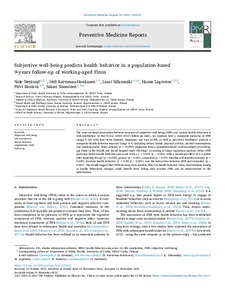Subjective well-being predicts health behavior in a population-based 9-years follow-up of working-aged Finns
Stenlund Säde; Koivumaa-Honkanen Heli; Sillanmäki Lauri; Lagström Hanna; Rautava Päivi; Suominen Sakari
https://urn.fi/URN:NBN:fi-fe2021120859716
Tiivistelmä
The cross-sectional association between measures of subjective well-being (SWB) and various health behaviors is well-established. In this 9-year (2003–2012) follow-up study, we explored how a composite indicator of SWB (range 4–20) with four items (interest, happiness, and ease in life, as well as perceived loneliness) predicts a composite health behavior measure (range 0–4) including dietary habits, physical activity, alcohol consumption, and smoking status. Study subjects (n = 10,855) originated from a population-based random sample of working-age Finns in the Health and Social Support study (HeSSup). According to linear regression analysis, better SWB predicted better health behavior sum score with a β = 0.019 (p < 0.001) with a maximum effect of 0.3 points after adjusting for age (p = 0.038), gender (p < 0.001), education (p = 0.55), baseline self-reported diseases (p = 0.020), baseline health behavior (β = 0.49, p < 0.001), and the interaction between SWB and education (p < 0.001). The results suggest that SWB has long-term positive effect on health behavior. Thus, interventions aiming at health behavioral changes could benefit from taking into account SWB and its improvement in the intervention.
Kokoelmat
- Rinnakkaistallenteet [29335]
